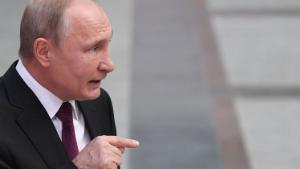Putin's plan for America is working better than he could have hoped
A virus of misinformation and mistrust rages in America.
On a melodramatic Monday, an independent report debunked Donald Trump's claims that the FBI was biased in its investigation into his campaign's 2016 links to Moscow. But the US President nevertheless bent the facts to say his suspicions had been vindicated. And the US Attorney General William Barr -- who is supposed to be an independent arbiter of justice, not act as Trump's personal lawyer -- excoriated the bureau anyway.
Meanwhile, the day's impeachment hearing -- into a scandal partly spawned by Trump's bid to prove that it was in fact Ukraine that meddled in the election three years ago -- descended into choleric feuding. In the looking glass world of Capitol Hill, Republicans -- once the most hawkish of Cold warriors -- are now using Kremlin talking points to shield a President whom Moscow wanted to help elect.
Washington feels like a fever dream. There's no agreement on common facts or assumption of goodwill between political adversaries in the nation's capital, which makes an honest assessment of Trump's actions impossible. It also means America may never heal from the recriminations and infectious doubts that stained the last presidential election -- and are already threatening the next one.
With its meddling operation in 2016, Russia had planned to inject the nation with bad blood, setting Americans against one another, fanning divisions and undermining confidence in US democracy.
It worked better than President Putin can have dared hope.
So what actually happened on Monday?
The House Judiciary Committee held its latest hearing as Democrats march toward the almost certain impeachment of President Donald Trump. While that was going on, the Justice Department's inspector general released a report about the origins of the FBI investigation into links between Trump's 2016 campaign and Russia.
What does the report say?
- The report dismantled claims by Trump and conservative propagandists that the Russia investigation was a "Deep State" plot to destroy him.
- It found no political bias against Trump in the FBI. It also debunks the theory that the inquiry was launched based on the Steele dossier, a document partly funded by Democrats.
- The report did note errors in how surveillance applications were made to a special court to get permission to wiretap former Trump foreign policy aide Carter Page. That was enough for Trump to claim his conspiracy theories had been proven, even though they weren't.
What did the hearing achieve?
- The hearing was scheduled to allow staff investigators to lay out the case that Trump abused his power by trying to get Ukraine to investigate his possible 2020 foe Joe Biden, and for Republicans to lay out their defense.
- To be honest, the hearing did not break much new ground. Democratic staff lawyers plowed through familiar evidence collected from key witnesses and public hearings and Republicans renewed their claims that the whole thing is just a big hoax.
What happens next?
In late breaking news, Democrats announced the plan to lay out articles of impeachment against the President on Tuesday morning.
'I'm pleased.'
While Washington is obsessing over the leaders of Russia and Ukraine, the gentlemen in question were meeting for crucially important talks in Paris.
The first meeting between Putin and Ukrainian president Volodymyr Zelensky was a study in contrasts, with Zelensky arriving at their summit in a low-key Renault and Putin in an armored black limousine.
Hosted by the leaders of France and Germany, the pair agreed on Monday to a ceasefire and committed to an important new step, pledging to work toward local elections in the separatist regions of eastern Ukraine. But they avoided the thorny issue of when, exactly, that might happen, with Zelensky telling reporters that Ukraine insists on full control of his country's eastern borders before such an election can take place -- and Putin saying that elections should come first.
The Russian president is a practiced hand at this kind of international summitry: He has been on the international stage for two decades now, and he understands the element of theater that goes into such highly scripted meetings. Russian state television repeatedly showed a clip of Putin prodding Zelensky to turn around for a photo spray.
"It's good, I'm pleased," a relaxed-looking Putin told reporters as he walked past the press center and answered questions about his one-on-one talks with Zelensky.
But while Zelensky may be the geopolitical novice, he also has advantages. He enjoys a broad popular mandate, despite a recent slip in the polls. He represents a younger alternative to the increasingly geriatric post-Soviet leadership currently running Russia, and he can engage with Putin in his own language. -- CNN's Nathan Hodge writes for Meanwhile from Moscow
84.7
That's how many millions of dollars Democratic candidate Michael Bloomberg has dropped on television advertising so far, CNN's David Wright reports. The former New York City mayor is now burning bills faster than fellow millionaire Tom Steyer, who had outspent the pack until this point.
Running for president is an expensive business. Here's Wright's staggering breakdown of television ad spending for all candidates through the week of Dec. 17:
1. Michael Bloomberg -- $84,671,479
2. Tom Steyer -- $79,465,347
3. Bernie Sanders -- $8,440,755
4. Pete Buttigieg -- $7,121,638
5. Andrew Yang -- $4,144,182
6. Joe Biden -- $2,099,474
7. Elizabeth Warren -- $1,883,182
8. Amy Klobuchar -- $1,754,386
9. Michael Bennet -- $1,095,101
10. Tulsi Gabbard -- $1,023,041
11. John Delaney -- $661,832
12. Julian Castro -- $48,923
13. Marianne Williamson -- $972
14. Cory Booker -- $0
15. Deval Patrick -- $0
News Courtesy: www.cnn.com











